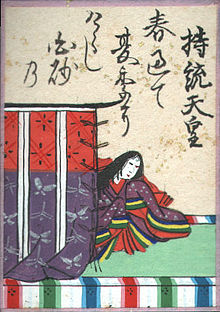Empress Jitō
Appearance


Empress Jitō (持統天皇 Jitō Tennō) (645 – December 22, 702[1]) was the 41st imperial ruler of Japan, according to the traditional order of succession. She was the daughter of Emperor Tenji. She took the throne in 687 following the death of her husband, Emperor Temmu, who was also her uncle, in order to ensure the eventual succession of her grandson, Emperor Mommu. In 697 she abdicated in Mommu's favor, but she continued to hold power as a cloistered ruler, which became a persistent trend in Japanese politics. She was also a noted poet. [2]
One of her 31-syllable poems was chosen by Fujiwara no Teika as the second entry in the very popular anthology Hyakunin Isshu.
Notes
- ^ Japanese dates correspond to the traditional lunisolar calendar used in Japan until 1873. December 22, 702 of the Japanese calendar corresponds to January 13, 703 of the Julian calendar.
- ^ pg 6,7,140 of Woman poets of Japan, 1977, Kenneth Rexroth, Ikuko Atsumi, ISBN 0-8112-0820-6; previously published as The Burning Heart by The Seabury Press.
